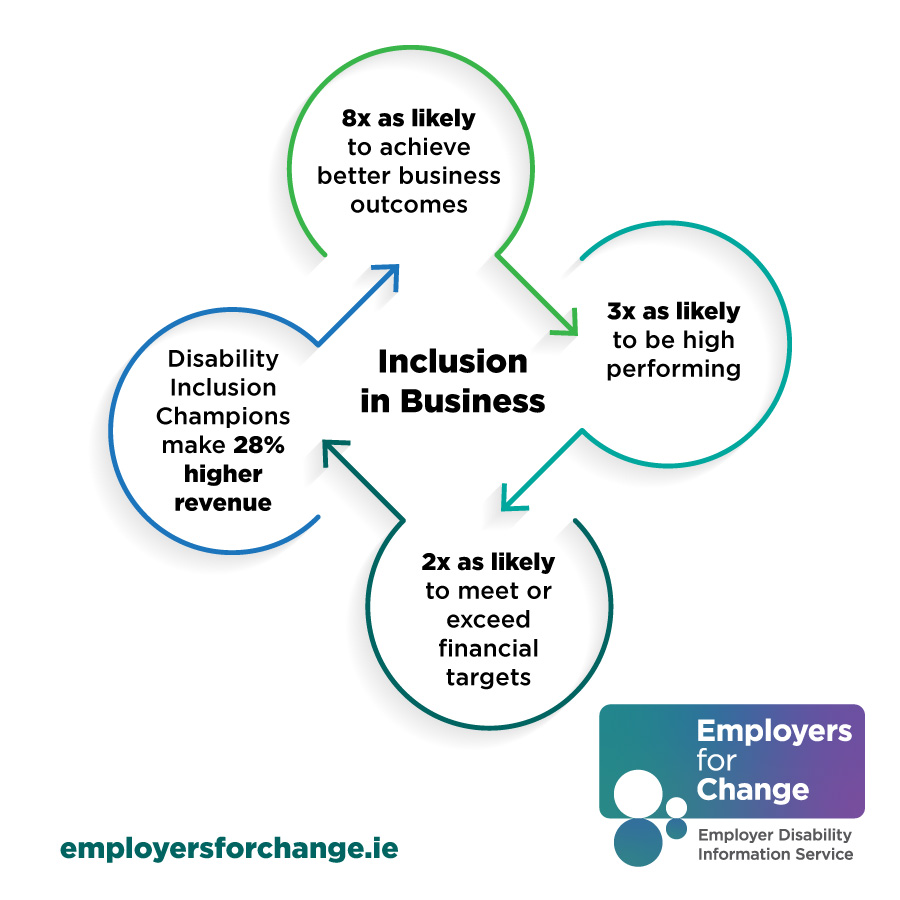As an employer, we need to be representative of the people we serve to be successful. As a business, we can better serve customers and clients if we are representing them within the core fabric of our organisation.
Ensuring the inclusion of people with a wide range of backgrounds, perspectives, experiences and qualities in employment has potential to advance creativity, innovation and productivity, as well as contributing to a more just society.
Engaging with this diverse and innovative talent pool makes good business sense and it will also lead to a richer culture within our organisation.
There are an estimated 1.85 billion people across the world living with a disability- when broken down this is equal to one in four people on the planet.
When you include friends and family of people with disabilities this adds another 3.3 billion potential consumers. In total disability touches 73% of consumers. The total spending power of this combined community is almost 11 trillion euros.

Inclusive Recruitment Toolkit
In 2022, Employers for Change and the Open Doors Initiative commissioned research by Atlantic Technological University Sligo on Inclusive Recruitment Practices, supported by AIB. The result of the research is an Inclusive Recruitment Toolkit which sets out accessible, practical and clear information and guidelines for employers and managers who wish to implement inclusive practices.
Barriers to Inclusion
Despite the fact the business case for diversity has been widely acknowledged and reported on. Those with a disability are still experiencing barriers when it comes to employment. These barriers undermine an individual’s right to equal participation in employment and society.
'Ensuring the inclusion of people with a wide range of backgrounds, perspectives, experiences and qualities in employment has potential to advance creativity, innovation and productivity, as well as contributing to a more just society.'
Our research found some of these barriers to include:
• Discrimination and Bias
• Inaccessible job applications processes
• Lack of awareness and understanding
• Language fluency
• Lack of experience in work culture
• Access to transport.
So, what practical steps can we take to make our organisation more accessible, inclusive, and attractive to people with disabilities?
Creating an Inclusive Recruitment Process
The Inclusive Recruitment Toolkit provides some clear suggestions and guidelines for making recruitment practices inclusive and equitable. It also provides links to a wide range of excellent specialised resources, as well as information on organisations that advise and support employers and managers on the practicalities of promoting inclusion.
There are six key steps to look at when creating a more inclusive recruitment experience for candidates:
1. Job Specification
Job descriptions are often times the first place where candidates who are experiencing barriers to employment deselect themselves.
2. Advertising
Where you advertise is important. Is your hiring site accessible and screen reader compatible?
Avoid using stock imagery and ensure you give details of your commitment to DEI.
3. Application
- Ensure you online application system is accessible and provide choices for submission of applications.
4. Selection Processes
- Consider CVs/Applications that do not have “traditional” routes to employment or have different experience - recognition of prior learning/experience.
5. Interview Processes
- Ensure requested accommodations are implemented on the day.
- Use competency-based interview questions that focus on the actual abilities/attributes required for the position.
- Make sure that interview panels are diverse, welcoming and have completed disability awareness training.
6. On-Boarding
- Provide the accommodations and supports that employees need to work effectively and happily.
- Consider a mentorship or buddy programme to ensure new employees are supported.
- Make sure all employees are aware of the Equality, Diversity and Inclusion policies in place.
- Reasonable accommodations should be offered at every one of the above six stages and throughout a person’s employment.
Conclusion
Embedding inclusive values in recruitment practice ensures that our workplaces have people with a diverse range of backgrounds, perspectives, skills and communication styles. In an inclusive workplace, there is equitable treatment, so that each employee feels valued and supported, and can bring their full potential to the workplace. Isn’t that the type of environment in which we all want to work?
Employers for Change specialises in providing free advice, information and training to employers that ensure they can recruit, employ and retain staff with disabilities. For more information on Disability Inclusive Recruitment and other disability awareness training please email info@employersforchange.ie or call, text or Whatsapp 085 1579603.
The Open Doors Initiative works with over 120 member companies and supporting partners, to provide job preparation and skills building training, mentoring, paid internships, placements, and job opportunities that support participants from marginalised backgrounds on their journey to work, further education or entrepreneurship. If you would like more information about becoming a member of Open Doors or receiving broader Inclusive Recruitment training, contact Open Doors at info@opendoorsinitiative.ie